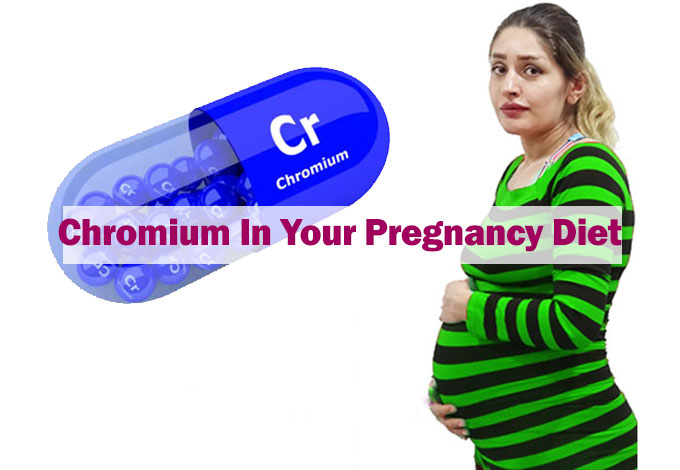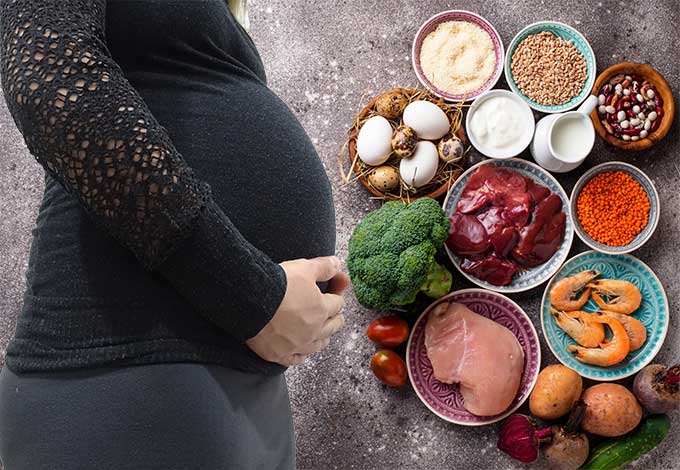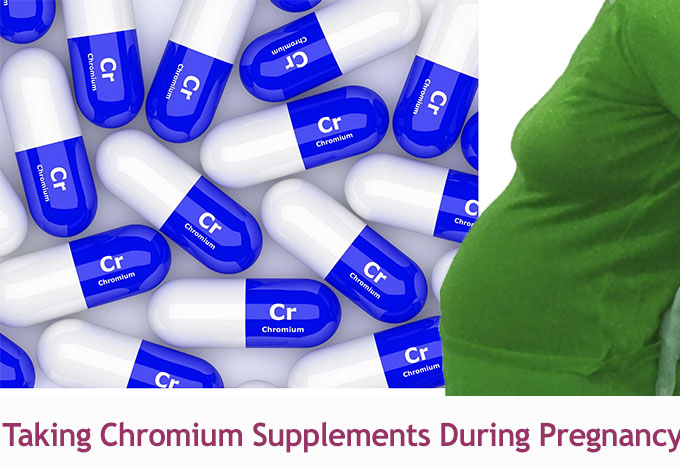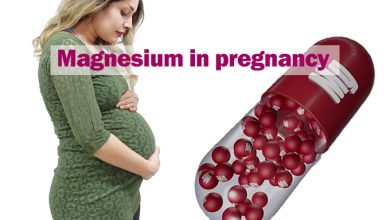Chromium In Your Pregnancy Diet

Chromium is found as a rare element in several foods and its constituent is chromodulin. Chromium is one of the important and essential minerals in the body, which is especially important for people with diabetes. Chromium helps break down carbohydrates and fats so that absorption and storage are finally done and ultimately regulates the body’s metabolism.
Chromium and its role in Pregnancy
Chromium, along with the insulin hormone, helps provide proteins necessary for the growth of fetal organs and regulates the normal level of glucose. Since one of the most common problems in pregnant women is gestational diabetes, chromium consumption becomes more important during pregnancy.
A study was conducted in one of the southern cities of India on women 20-35 years old with a gestational age of 22-28 weeks. The result was that women with gestational diabetes in that city, compared to pregnant women who did not have gestational diabetes, had lower levels of chromium.
The supply and lack of chromium is very effective for the health of the growing child. Besides helping to produce protein in the child’s body, it also plays an important role in the breakdown of fats, carbohydrates, and proteins.
Chromium stimulates the synthesis of fatty acids and cholesterol, which are important for brain function and other bodily processes. Therefore, chromium is an essential nutrient whose consumption during pregnancy is very important for the health of the mother and the developing fetus.
Related article: vitamins for pregnancy
What foods contain chromium?
Most people get enough chromium from their diet every day. However, to mention Chrome resources, the following can be mentioned:
- Vegetables: such as broccoli, which is a rich source of chromium, potatoes, green beans, lettuce, and cabbage.
- Cereal products such as whole grain bread and oatmeal
- Fruits and juices: apples, bananas, tomatoes, and grapes
- Milk and dairy products
- Beef, chicken, turkey

As mentioned, studies have shown that adequate consumption of chromium affects the function of insulin and is especially necessary for people with type 1 and type 2 diabetes. Although the probability is low, if the amount of chromium required by the person is not provided by nutrition, he can use supplements and eliminate the risks of chromium deficiency. Its supplements are usually used for muscle building and by athletes.
Related article: Indigestion and heartburn in pregnancy
Taking Chromium Supplements During Pregnancy
Although chromium deficiency is a rare phenomenon, the possibility of its occurrence increases during pregnancy; However, taking chromium supplements is very dangerous for pregnant women and is not recommended.
Chromium picolinate is a type of chromium found in food supplements. It is attached to three molecules of picolinic acid. Taking these supplements on your own is very dangerous, and in case of chromium deficiency, you should consult your doctor first.

Pregnant women should get all the chromium they need from food and natural sources. It is better to eliminate the deficiency of chromium by changing the diet and including more fruits and vegetables containing chromium, as well as chicken, fish, meat, eggs, and whole grains in your diet.
Related article: How is labor pain?
Chromium requirement range
A certain amount of chromium is recommended for each person with their condition; In general, daily consumption of 15-200 is sufficient.
Pregnant women need 30 micrograms of chromium per day. (If a pregnant woman is younger than 19, the recommended amount is 29 micrograms.) It’s not necessary to get this recommended amount every day But keep in mind that you should use it every few days.
Severe chromium deficiency has only been observed in patients whose nutritional conditions are special. Some studies have shown side effects such as skin irritation, headaches, dizziness, and nausea when high doses of chromium are consumed.
There are no dangerous effects of consuming high doses of chromium during pregnancy. However, its high consumption can in some cases cause prolonged headaches, insomnia, allergic reactions, irregular blood sugar, and reactions with other drugs.
Related article: Everything you don’t know about ectopic pregnancy!
How much chromium do you need during pregnancy?
Women in different periods need the following daily amounts of chromium:
- Non-pregnant women 19 to 50 years old: 25 micrograms per day
- Pregnant women 18 years old: 29 micrograms per day
- Pregnant women 19 to 50 years old: 30 micrograms per day
- Breastfeeding women 18 years old and older: 44 micrograms per day
- Breastfeeding women 19 to 50 years old: 45 micrograms per day
You also don’t need to take this recommended amount of chromium every day. Instead, you can schedule your chromium intake so that your average intake over a few days or a week equals the sum of these recommended amounts.
Do you need chromium supplements during pregnancy?
Because while pregnant women are at higher risk for chromium deficiency, some forms of this mineral can be dangerous in high doses during pregnancy.
If you are concerned that you may be deficient in chromium or if you have a specific medical condition such as diabetes, you should talk to your doctor about taking a chromium supplement, but do not take chromium supplements on your own.
